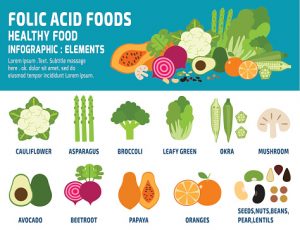Folic acid awareness week is a way to bring the issue of folic acid deficiency to light and educate people about good sources of this important vitamin.
Advertisement
The first week of January is National folic acid awareness week in the United States. Research shows that folic acid deficiency may not be common in North America, but there are some people who barely get enough of it. There are also cases where people get too much folic acid and that can be hazardous to health.
What is folic acid
Folic acid is a B vitamin that can be found in all sorts of foods, including dried beans, lentils, green leafy vegetables and whole-wheat products. It helps our body produce and maintain new cells, as well as prevent changes to DNA that could potentially lead to diseases, such as cancer.
According to the British Dietetic Association folic acid helps to produce healthy red blood cells, aids in rapid cell division and growth, and is important for pregnant women in order to prevent major birth defects, such as brain or spinal problems. The association reports that folic acid generally enhances the human brain. In fact, Dutch researchers suggest that folic acid supplementation could improve memory.
Studies show that folic acid is vital to the metabolism of specific biochemical reactions in the human body, as well as for the metabolism of certain drugs. Folic acid deficiency has not only been linked to birth defects but to something called “hyperhomocystinemia”, a condition linked to increased cardiovascular disease.
On the other hand, too much folic acid has the potential to cause neurological damage. Research indicates that this is true for those who are at risk of vitamin B12 deficiency. If you fall into this category, you should be careful about consuming too much folic acid from fortified foods and supplements. High intake of folic acid may mask the diagnosis of vitamin B12 deficiency- thus putting you at risk for neurological problems.
Sources and recommendations for folic acid
We are lucky that we have a lot of foods within our reach that contain folic acid. Here is a list of some foods rich in folic acid:
- Spinach
- Romaine lettuce
- Broccoli
- Citrus fruits
- Beans
- Peas
- Lentils
- Avocados
- Okra
- Seeds and nuts
- Carrots
- Celery
- Squash
- Asparagus
- Corn
- Beets
- Cauliflower
- Brussels Sprouts
The best approach is to consume a variety of different foods. While most people rely on the above foods for their daily intake of folic acid, supplements can also be used to top up your folic acid intake. The Institute of Medicines Food and Nutrition Board recommends children age 1-3 get 150 mcg per day of folic acid. Teenagers should get 300 mcg, while adult men and women should get 400. If you are a pregnant woman; 19 years or older, the suggested amount is 500 mcg per day.
Folic acid deficiency, anemia and other effects
There is a condition known as folic acid deficiency anemia if a person does not eat enough foods containing folic acid or a person’s body does not absorb enough of the vitamin. Some medications can raise this risk of folic acid deficiency anemia, including certain drugs taken for cancer, seizures and rheumatoid arthritis.
The signs of folic acid deficiency include fatigue, forgetfulness, loss of appetite and weight loss. Most people with this type of anemia are prescribed folic acid pills.
Folic acid deficiency can also increase the risk of a second heart attack, as well as increase the risk of strokes. Some studies show that low folic acid levels have been linked to a drop in male sperm count. Low bone density and allergic reactions have also been associated with folic acid deficiency.
Folic acid benefits before pregnancy
 Years of research indicate that a lack of folic acid in the body of a pregnant female can impact a baby’s neural tube. This can lead to defects such as, spina bifida – incomplete development of the spinal cord or Anencephaly, incomplete development of major parts of the brain. Sadly, babies with anencephaly normally do not live long. Those with spina bifida are disabled for life.
Years of research indicate that a lack of folic acid in the body of a pregnant female can impact a baby’s neural tube. This can lead to defects such as, spina bifida – incomplete development of the spinal cord or Anencephaly, incomplete development of major parts of the brain. Sadly, babies with anencephaly normally do not live long. Those with spina bifida are disabled for life.
It’s easy to see that folic acid benefits your baby. It may protect your baby from neural tube defects by at least 50 percent. If you already have a child with a neural tube defect, getting the right amount of folic acid may reduce your risk of having a second child with a defect by as much as 70 percent.
Experts with the he Centers for Disease Control and Prevention (CDC) say that taking about 400 mcg of folic acid each day for at least one month before you conceive and during the first trimester can cut your chances of having a baby with defects by well over 50 percent.
Science shows that neural tube defects occur about 25 to 30 days after a woman gets pregnant. Since the defects form so early, women should begin taking vitamins before they get pregnant. A good rule is to take folic acid as soon as you stop birth control.
Research has been able to determine that folic acid may also protect babies against cleft lip and palate, premature birth, low birth weight, and poor growth in the womb. Some reports suggest that it may reduce the risk of pre-eclampsia as well.
Folic acid side effects
Advertisement
If you have a folic acid deficiency your doctor can guide you towards the best course of action. In some cases, people have an allergic reaction to folic acid. The signs can include hives, difficulty breathing, and swelling of the face, lips, tongue or throat. If this happens to you, seek emergency medical assistance.
There are some less serious side effects such as loss of appetite, bloating, a bitter taste in your mouth, or a feeling of irritability. You should discuss any of these signs with your doctor.
Although there is a long list of foods that contain folic acid, it can be difficult with our fast-paced schedules to get all the nutrients we need each day. Even with careful planning, some people still don’t get all the vitamins they need from their diet. In these cases, it is important to supplement with a folic acid each day. Talk to a certified nutritionist and doctor about how you and your family members can maintain a good folic acid level and stay healthy.

